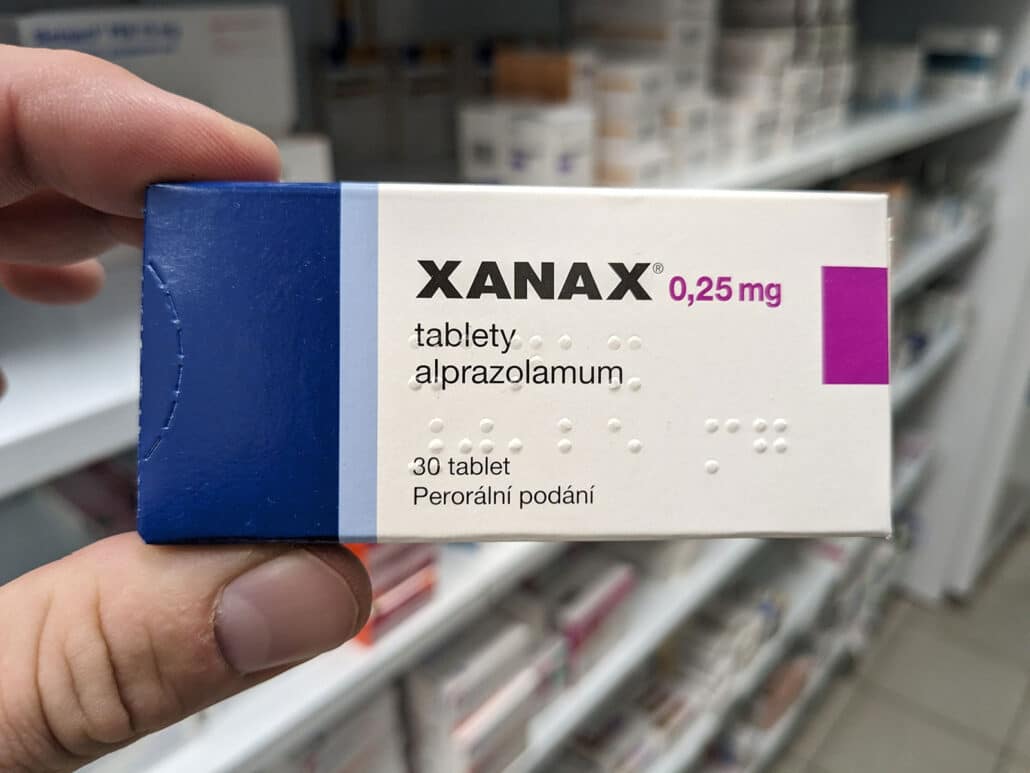Is Xanax addictive? Also known as alprazolam, Xanax, the brand name, is a medication that is commonly used for anxiety and panic disorders. While it is an effective treatment for many people, it also has the capacity to become addictive. Because of this, it’s important to reach out to a professional addiction treatment center if you believe that you’ve developed a tolerance to this drug.
Table of Contents
How Xanax Works
Xanax works by producing a calming effect within your mind. It does this by binding to gamma-aminobutyric acid (GABA) receptors. Normally, GABA neurotransmitters are responsible for blocking signals and calming down brain activity. This is especially important during times when extra nerve cells are firing in the mind.
GABA receptors are a kind of chloride ion channel. When alprazolam binds to the channel, it makes GABA’s effects more powerful. As a result, taking Xanax and other brands of alprazolam can help you manage stress, fear, and anxiety.
Xanax is technically classified as a benzodiazepine (aka benzos). Besides treating panic and anxiety disorders, Xanax can help with agoraphobia. As a prescription drug, Xanax can only be purchased from a doctor. It is not safe to use Xanax that was purchased online or on the street.

Is Xanax Addictive?
Thanks to its effects on the mind, Xanax can be incredibly addictive. Even when you take this drug as prescribed, it can lead to dependence.
When you take Xanax, your body gets used to having the drug present. Because your body is accustomed to having Xanax present, it will struggle if you suddenly stop taking Xanax. This is what doctors call drug dependence.
Long-term Xanax use can also cause a tolerance to develop. Basically, your neurotransmitters, mind, and body become used to having a certain amount of Xanax present. Because of this, you may have to take more Xanax in order to achieve the same effect.
Unfortunately, a tolerance to Xanax can develop quickly. Unsurprisingly, there are many Americans who are addicted to this drug. Xanax is the most prescribed psychiatric drug, which is why so many people are at risk of having a Xanax addiction.
Signs of Xanax Addiction
After someone has developed an addiction, it can impact all aspects of their social, physical, and mental well-being. Instead of taking care of their family and professional responsibilities, they may devote their time to drug-seeking behavior. If you or a loved one is suffering from a Xanax addiction, you may notice some of the following signs.
- Legal issues from Xanax abuse
- Obsession with finding and using Xanax
- Inability to quit using when they want to
- Problems controlling the amount they use
- Lack of interest in favorite pastimes
- Increased risk taking
Once someone has developed an addiction to Xanax, they’ll spend more of their time and energy using drugs. They may be more likely to drive while under the influence. The drug can also negatively impact their ability to maintain a job, complete their schoolwork, or maintain healthy relationships.
After someone decides that they want to become sober, they may develop withdrawal symptoms. Quitting cold turkey can cause convulsions, headaches, confusion, and other uncomfortable symptoms. Xanax withdrawal produces symptoms that are similar to barbiturate withdrawal. Because of this, people may experience some of the following side effects when they begin the withdrawal process.
- Drowsiness
- Anxiety and nervousness when they stop using (panic attacks)
- Irritability from cravings
- Prickling and burning sensations in the feet and hands
- Diarrhea
- Aggression
- Insomnia
- Sweating
- Seizures
- Nausea and vomiting from physical dependence
- Changed sense of smell
- Light and noise sensitivity
- Reduced appetite
- Delirium
- Headaches
- Blurry vision
- Muscle cramps
Because Xanax is a benzodiazepine, it can cause a side effect known as rebound anxiety. This means that someone who takes Xanax for anxiety may experience anxiety when they stop using the drug. Unfortunately, rebound anxiety is far more severe than the initial anxiety the individual experienced when they first sought treatment. It typically lasts for two to three days before returning to the individual’s baseline level.

Risks of Xanax Addiction
While quitting Xanax might be uncomfortable, becoming sober can help you avoid short-term and long-term side effects. A Xanax addiction can have a major impact on your physical and mental health. This is especially true if you also use alcohol and other substances at the same time.
Short-Term Risks
In the short run, there is a risk of overdosing on Xanax. An overdose is even more likely if you combine Xanax with alcohol or other drugs. You may also experience temporary side effects, like nausea, paradoxical anxiety, and confusion.
Some people may have a Xanax allergy. If you are allergic, you may develop lip swelling, a rapid heartbeat, hives, or anxiety. Allergic reactions can cause life-threatening symptoms, so it is important to reach out to a medical professional if you think that you are having an allergic reaction to this drug.
When Xanax is used for off-label purposes, it is more likely to cause sedation, lightheadedness, and slowed thinking processes. Your blood pressure, respiration, and heart rate may slow down. Additionally, you may lose the ability to make rational decisions or to control your impulses.
Long-Term Risks
Is Xanax addictive? In the long run, there is a strong likelihood that you may develop a dependence on this drug. Once your body gets used to having Xanax present, it will need Xanax in order to function normally. If you don’t have access to this drug, you may experience withdrawal symptoms. At this point, you are said to have a dependence on Xanax.
If you use Xanax for an extended period of time, it can impact how your peripheral nervous system and central nervous system function. Misusing Xanax can cause changes in behavior and modifications to the brain’s neural pathways. As a result, you may be more susceptible to certain medical conditions and chronic diseases.
How Long Island Interventions Can Help
If you or a loved one is suffering from a substance abuse disorder, help is available. At Long Island Interventions, you can access detox support, therapy, counseling, medication-assisted treatment, and long-term recovery tools. During intake, a professional addiction specialist will discuss the best options for your unique situation.
Medication-Assisted Detox
In a medication-assisted detox, you can get help with managing your withdrawal symptoms. Medical professionals provide around-the-clock supervision. This helps to ensure the best level of safety and comfort.
Therapy and Counseling
To treat an addiction, you have to do more than stop using drugs. You also have to treat the co-occurring disorders, family dynamics, and ways of thinking that originally fueled the addiction. At Long Island Interventions, you can get support, advice, and important sobriety tools through a range of different therapy programs.
- Couples therapy
- Cognitive behavioral therapy (CBT)
- Dialectical behavior therapy (DBT)
- Motivational interviewing
- Individual therapy
- Group therapy
- Wilderness therapy
- Family therapy
Alumni Programs
While rehab eventually comes to an end, your recovery process never stops. After treatment, Long Island Interventions provides ongoing support through aftercare programs. You will receive a customized aftercare plan that includes the support meetings, therapy, and living arrangements you need to stay sober.
As a part of your aftercare plan, you’ll get help building a sober social network. A healthy social circle can provide you with added support. Additionally, ongoing therapy can help you rebuild relationships with loved ones that may have been damaged by your substance abuse.
Begin Your Recovery Journey
Is Xanax addictive? While Xanax may be prescribed for medical conditions, it can still be addictive. An addiction is even more likely if you have been using Xanax for off-label purposes.
Fortunately, you don’t have to suffer from a substance use disorder forever. By getting detox and rehab support, you can take the first step in becoming sober. At our treatment facility, we offer various treatment programs and treatment options to help you overcome Xanax addiction. These may include medical detox to safely manage withdrawal symptoms, followed by therapy and counseling to address the underlying causes of addiction. Our team will work with you to develop a personalized treatment plan that meets your unique needs and supports your long-term recovery.
To learn more about how we can help your recovery process, reach out to Long Island Interventions today.
Published on: 2024-12-29
Updated on: 2025-06-05

